Iran Angered By European Criticism Of Its Rights Violations
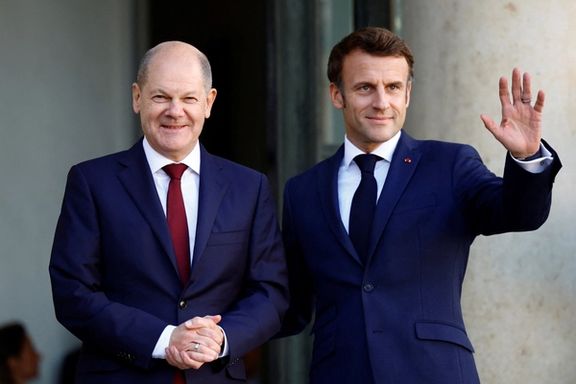
Iran reacted Sunday to the meeting of the French President with a group of Iranian activists saying the statements by Emmanuel Macron were “shameful”.

Iran reacted Sunday to the meeting of the French President with a group of Iranian activists saying the statements by Emmanuel Macron were “shameful”.
Foreign Ministry Spokesman Naser Kanani condemned the talks between Masih Alinejad and the French President saying it is surprising that Macron “lowers his level to hold meeting with a hated person who has clearly tried to spread violence and terrorist acts in the Islamic Republic and against its diplomatic missions abroad.”
French President Emmanuel Macron met a group of Iranian female activists in Paris Friday calling the protests in Iran a “revolution”.
US-based activist Masih Alinejad has for years led a campaign encouraging Iranian women to remove their obligatory headscarves.
However, the Iranian spokesman said, “this meeting is a violation of France's international responsibilities in the fight against terrorism and violence.”
This comes as the Islamic Republic is now under great international pressure for its use of violence against its own people during anti-government protests following the death of Mahsa Amini in police custody in September.
At the same time, Kanaani also called the German Chancellor's recent stance on Iran’s violations of human rights “interventionist, provocative and undiplomatic”.
In a video posted on his twitter account Saturday, Olaf Scholz slammed the Iranian regime for use of violence against protesters and called for a new round of EU sanctions on the Islamic Republic next week.
At least 326 people including 43 children and 25 women have been killed by Iranian regime in the ongoing nationwide protests.
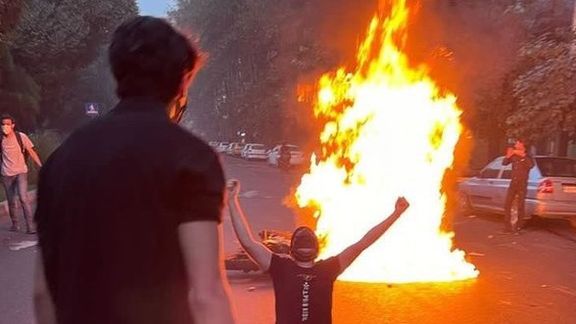
Iranian academic Hadi Khaniki says the current wave of protests in Iran may have originated from the younger generation's feeling of being marginalized.
What the academic is referring to is the dual lack of social freedoms and economic opportunity in a country rich with natural resources but hampered by religious ideology and an inefficient, centralized economy.
Khaniki told Etemad Online in Tehran that he still does not know any way out of the crisis other than holding dialogues. His statement is obviously mindless of the fact that it takes two to tango and that there will be no dialogue while the regime remains unaccountable and exhibits signs of arrogance.
Khaniki said that during recent years the Iranian society has become more pluralistic, but the government continues to believe in controlling and restricting the society's lifestyle and political choices.
He said Iran's new generation is fighting the government to put an end to discriminations against young Iranians. Although networking and voicing demands through social networks exist in all societies, the Iranian government behaves badly by ignoring the young generation’s demands, in an environment where most social, economic and political activities is controlled by the state.
Meanwhile, Khaniki pointed out that the continuation of the discriminatory distribution of privileges in the interest of the older generation has escalated the protests in Iran. He added that the Iranian government ignores the fact that responding to demands is part of its responsibilities.
As the protests in Iran entered its third month, another Iranian reformist commentator, Mohammad Reza Tajik suggested in a commentary published by Etemad newspaper that government officials should avoid making annoying comments that will further enrage young protesters.
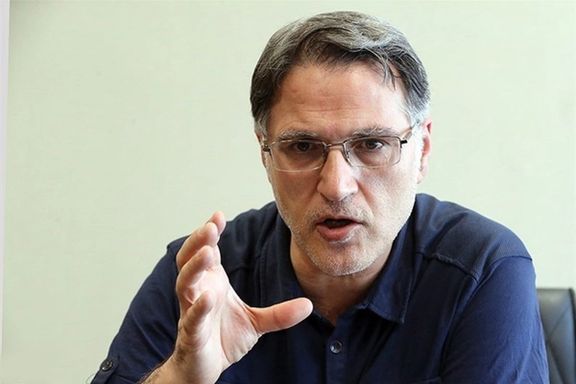
Tajik characterized Iranian officials' rhetoric as outdated and rotten, and their tone as aggressive, violent and rude. "They say no to all the criticisms and demands for change. But this is a language that cannot go any further, hinders communication and remains futile," he said.
Such a rigid rhetoric, said Tajik, puts an end to human bonds and particularly alienates the younger generation. It bruises young Iranians' soul and comes across as bad lies and deceit.
He pointed out that "purifying the political language will purify political action. But this should take place constantly as political rhetoric needs to be consistent with the requirements of modern times. Iranians' political language should be rejuvenated in the same way that Romans did away with the roughness of Latin and turned to a rich language that was suitable for writing laws."
Tajik further opined that healthy politics can be preserved only when politicians do away with rude, vulgar, and violent language. He said politicians should not think that whatever they say is true and comes from God. Instead, they should put their ideas to the test of the people's vote.
He pointed out that under the current circumstances when society is agitated unfair comments will add to its anger and hatred. Thus, it is wise for the country's officials to at least remain silent not to enrage the people even more.
Tajik did not name anyone, but he was obviously talking about hardliner politicians and military commanders considered to enjoy the confidence of Supreme Leader Ali Khamenei.
His representative to Khorasan Province Ahmad Alamolhoda and the editor of Khamenei's office's newspaper Kayhan, Hossein Shariatmadari, on a daily basis pump waves of hate speak into society. Some Revolutionary Guard commanders keep humiliating Iranian protesters by calling them "flies" a species inferior even to "goats," a nickname Alamolhoda gave to Iranians who protested against a rigged election in 2009 and an unusual fuel price rise in 2019.
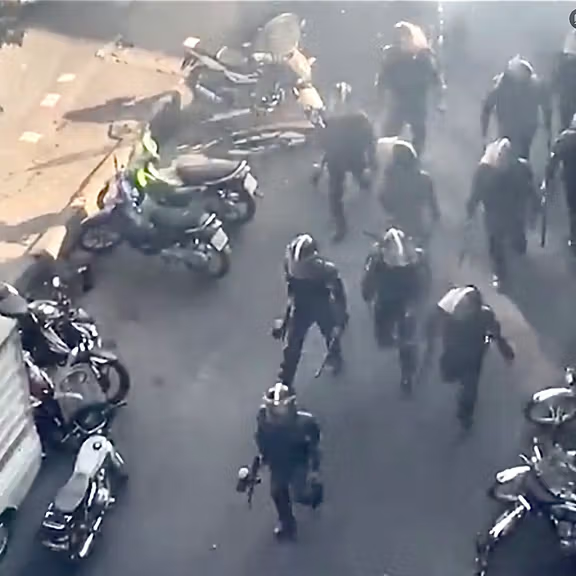
Iran's hardline judiciary has indicted 11 people over the killing of a Basij security force member during recent protests that could carry the death sentence.
News agency IRNA said some of the 10 men and one woman were charged with "corruption on earth", which can be punishable by death, for the alleged killing of a member of IRGC’s Basij militia on November 3 in Karaj near Tehran.
The activist HRANA news agency said 336 protesters had been killed in the unrest as of Friday, including 52 minors. Thirty-nine members of the security forces had also been killed, while nearly 15,100 have been detained, it said.
Basij militia are always deployed against protesters and are notorious in using violence. So far, the government has not indicted any of its personnel for violence against citizens.
The Iranian government has labeled the protests as riots fomented by “enemies” including the United States.
UN experts have urged Iran "to stop using the death penalty as a tool to squash protests", noting that charges carrying the death penalty were brought against eight people in Tehran on October 29.
Iranians from all walks of life have taken part in protests, with unprecedented support voiced from abroad and by Iranian celebrities and athletes.
The unrest has added to strains in Iran's ties with Western powers which have imposed sanctions on Iranian groups and individuals linked to the crackdown.
German Chancellor Olaf Scholz said he favored a new round of European Union sanctions next week.
"We want to continue to step up the pressure on the Revolutionary Guard Corps and the political leadership," he said in a video posted on Twitter.
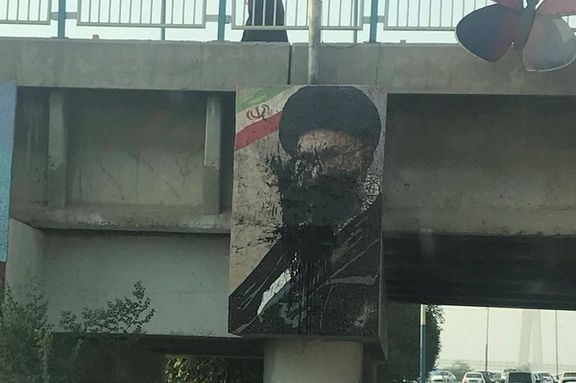
Western officials have been meeting with Iranian activists abroad while the United Nations may step up pressure on Tehran for the harsh crackdown on protests.
The first high-level western official to meet with an Iranian activist was US Vice President Kamala Harris who in her meeting with Iran-born actress and activist Nazanin Boniadi October 14 underscored that the Biden-Harris Administration would continue to stand with Iranian women and citizens.
Two weeks later, on October 29, Canadian Prime Minister Justine Trudeau became the first world leader to join Iranians at a demonstration in Ottawa. Trudeau hinted at the possibility of regime change in Iran in his exchange of words with Iranian activists including Hamed Esmaeilion who initiated global rallies against the Islamic Republic soon after the protests began.
French President Emmanuel Macron also met Friday with a delegation of expat activists and rights advocates -- including Masih Alinejad, Shima Babaei, and Ladan Boroumand. Macron was the first western leader to refer to the Iranian protest movement as a “revolution”.
German Chancellor Olaf Scholz also said a video posted on Twitter Saturday that he favors a new round of European Union sanctions on Iran next week to step up the pressure on the Revolutionary Guards (IRGC) and the political leadership.
Majid Golpour, Paris-based international affairs expert, told Iran International TV Friday that the European Union will completely revise its general Iran policies “in form and content” within the next ten days and member states will release official statements outlining the new measures they will adopt vis-à-vis the Islamic Republic in the light of the developments in the past two months.
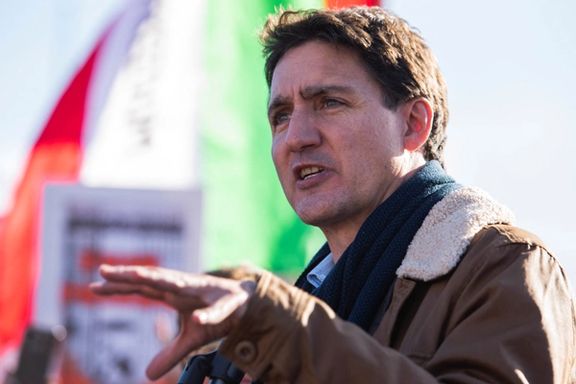
These measures, Golpour added, may include closure of EU embassies in Tehran and establishing secure channels for European parliamentarians’ contact with “Iranian civil society” and its activists while also no longer overlooking Iran's breaches of the 2015 nuclear agreement such as higher uranium enrichment and stockpiling to ensure the deal could be restored.
The four world powers have submitted a draft resolution to the board of the International Atomic Energy Agency (IAEA) which requires Iran to urgently explain uranium traces found at three undeclared sites, Reuters reported Friday. Iran has agreed to hold a meeting with IAEA officials in Tehran after next week's IAEA board meeting to resolve outstanding issues.
Deputy chief of the Iranian Judiciary Kazem Gharibabadi told reporters in New York Saturday that he planned to take part in meetings of the UN General Assembly Third Committee to hinder the “circulation of hostile and fake narratives by the West and the US on recent developments in Iran.”
Calling the recent protests “riots”, he claimed that the imprisonment of thousands of protesters, as rights groups have reported, is false and that foreign enemies were seeking to put pressure on Iran for their own political gain.
Germany and Iceland have called for an urgent meeting of the UN Human Rights Council on the situation in Iran.
UN experts, including Javaid Rehman, Special Rapporteur on the situation of human rights in Iran Friday, urged Tehran to stop indicting people with charges that carry the death penalty for participation in peaceful protests.
“The experts also urged immediate release of all those arrested for peacefully protesting arbitrarily for ‘exercising their legitimate rights to freedom of opinion and expression, association and peaceful assembly and for their actions to promote and protect human rights and fundamental freedoms through peaceful means.”
On November 6, 227 members of the Iranian Parliament called on the judiciary to act decisively against people arrested during the protests using even the death penalty.

Antigovernment demonstrations continued in Iran on Saturday, with gatherings, sit-ins, and student protests in various cities.
In the capital Tehran students of Tehran, Sharif, Science and Culture, and Beheshti universities staged protests to show anger at the apprehension of their colleagues by security forces. Reports say that more than 200 university student shave been detained since September.
In Kharazmi University of Karaj, west of Tehran, students chanted slogans such as, “People, why are you sitting still? You are our savior” and "They have killed students and replaced them with Mullahs.”
The students at Esfahan University of Arts also wrote in a statement that at a time when coffins of young people are being carried, they will not attend lectures, either in person or online.
In the south, students of Hormozgan University of Medical Sciences went on strike and refused to attend classes and hospital duties in support of students suspended during the protests.
Students have been at the forefront of demonstrations against Iran’s authoritarian regime within the past eight weeks.
Based on the latest report by the Oslo-based Iran Human Rights Organization at least 326 people including 43 children and 25 women have been killed by security forces in the ongoing nationwide protests.
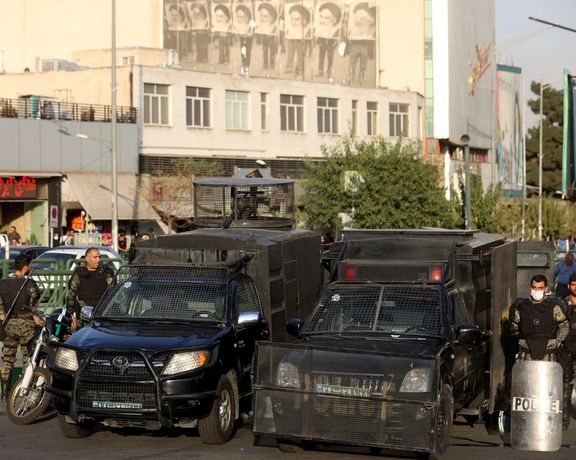
A group of experts at the United Nations have urged Iranian authorities to stop indicting protesters with charges punishable by the death penalty.
Sixteen UN-appointed independent human rights experts urged the Iranian government in a statement on Friday to stop using the death penalty as a tool to squash protests.
“We reiterate our call to immediately release all protesters who have been arbitrarily deprived of their liberty for the sole reason of exercising their legitimate rights to freedom of opinion and expression, association and peaceful assembly and for their actions to promote and protect human rights and fundamental freedoms through peaceful means,” they said in the statement.
Eight people were charged on October 29 in Tehran with crimes carrying the death penalty, namely “waging war against God” or “moharebeh” and “corruption on earth”. Two days later, the Tehran prosecutor announced that some 1,000 indictments had been issued in connection with recent “riots” in Tehran province alone.
Earlier, a group of 227 parliament members in Iran called on the Judiciary to issue death sentences for some people arrested during the ongoing antigovernment protests.
“With the continuous repression of protests, many more indictments on charges carrying the death penalty and death sentences might soon be issued, and we fear that women and girls …might be particularly targeted”, warned the UN experts.
Since September 16, authorities have detained thousands of protesters, including many women, children, youth and at least 51 journalists, 37 of whom remain in jail – many incommunicado.